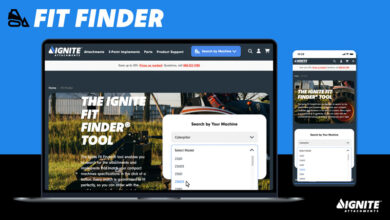Interview: EETC’s new Managing Director
The Equipment & Engine Training Council announced its recent organizational restructuring. The group says its “significant growth that would not have been possible without the unwavering support of our dedicated members.”
Effective January 1, 2024, the group announced it has divided the responsibilities of the Executive Director into a Managing Director position and an Educational Director position. The EETC staff includes:
Rainy Lehman – Managing Director
Rainy has been with EETC since 2016. As Managing Director, Lehman will manage the organization’s business side. She will be responsible for managing the organization and representing the interests of its members, ensuring the success and growth of the Trade Association by effectively managing its operations, advocating for its members, and promoting the organization’s mission and goals.
NOTE: We spoke with Lehman to ask more about her role and the group’s work moving forward. That interview is below.
Erik Sides – Education Director
Erik has been with EETC since 2012. As Education Director, Sides will ensure the organization’s members have access to high-quality educational resources that help them stay current with industry trends and best practices.
Gabe Carson – Technical Trainer
Gabe has been with the organization since 2018. As the Technical Trainer, Carson will assist the Educational Director in designing and developing instructional materials and provide practical, hands-on training experiences to our members.
Interview with Rainy Lehman
OPE Business: How did you get started with the EETC and grow into this role?
Rainy Lehman: I’ve been in this new role for 15 days. And I’ve been with the organization for seven years. I came here to help with accounting and administrative work. It was just Erik Sides and me. Over the last 7 years, the organization just exploded, with the overall push for more technical education compared to a four-year college track.
As we’ve grown, we needed to separate the business work from the education director duties. The new managing director role needed to be broken out, and now I can focus on the business side with our members and board of directors. Erik is well suited for his role as education director. His background in the industry, his experience and knowledge of the technical side. He can focus on filling the educational needs of the organization.
And we have Gabe Carson as our technical trainer. Plus, we’re hoping to fill a fourth role soon.
OPEB: Your group’s mission is “to address the shortage of qualified technicians in the outdoor power equipment industry.” Where are we today as far as that shortage is concerned for dealers?
Lehman: We are planning a retreat in February with our board to look at our mission, the state of the industry, and to address specific questions like that. What I can say now is we get loads and loads of calls from people looking for qualified technicians. They are looking for someone who knows at least enough to get started in the shop, and then they can address continued training with us.
We work with high schools and community colleges to help position them to be able to fill technician roles. We also work with prison facilities to help them provide education opportunities that can help rehabilitate people. We are taking all these opportunities and running with them. Covid pushed us into online learning, to benefit both educators and students. Then we saw how Covid changed the lives of individuals looking for new career opportunities, and we created ways for individuals to learn new skills and gain certifications.
OPEB: The technician shortage, is it regional or national? Is it better or worse for certain types of equipment?
Lehman: It is a nationwide problem, and it’s complex. Equipment dealers need technicians who know how to handle paperwork, like writing warranty work. Parts lookup requires training. Failure analysis is a big part; the systematic diagnosis needs to happen quickly and efficiently. Shop safety education is a big part of this work.
We generally train on four-stroke engines first, and then people will learn how to service two-stroke engines. And we prioritize the electrical systems work because so much equipment has an electrical system. We train on diesel engines, and also generators. Our course library is large and growing.
We work with equipment dealers of all types and sizes, and rental operations too. We had Home Depot reach out to us recently to help with rental equipment teams. We are even helping municipalities that have their own fleets, plus universities.
OPEB: Who is doing the hard work to help you address this problem?
Lehman: Our manufacturers and distributors support our mission with their sponsorships and donations. We have committees made up of competing businesses, and they set aside their competitive side to help our work flourish for skilled technicians. Our members are fantastic.
OPEB: How much of this current situation is unique to the OPE industry, or is it just part of today’s economy?
Lehman: I think there are differences, but it’s a wide-ranging problem in our economy. I need to get my feet a little more wet before I can more completely answer this question. We want to see a revival of trade education. We are working to grow our courses in person and online. And I make immediate connections between our graduates and businesses that need their skills. We have a lot of exciting things planned.
For more information, visit www.eetc.org or call 888-406-1810.





